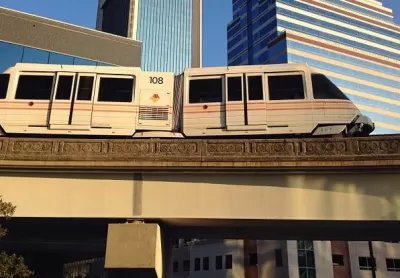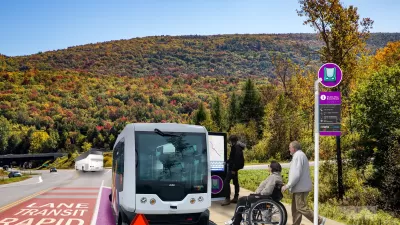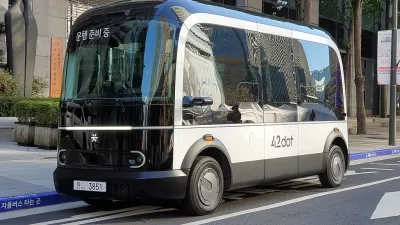The city’s aging monorail system will be repurposed as part of an expanded 10-mile shuttle system.

Jacksonville, Florida’s monorail system will be replaced by autonomous shuttles, reports Dan Zukowski in Smart Cities Dive. “The aging 2.5-mile elevated transit system will become part of 10-mile automated shuttle service with transit-oriented development at some stations.”
The Jacksonville Transportation Authority will repurpose parts of the three-decade-old monorail system to build 10 miles of shuttle paths. The 3-mile first Bay Street Corridor phase “will connect major sports stadiums and entertainment venues along Bay Street with the existing monorail.” Rather than major construction, implementation work for the project will consist of the installation of cameras, antennas, and sensors at intersections.
“The proposed Shipyards station along the [Bay Street] corridor is one of the locations selected as a possible site for transit-oriented development. According to a plan posted on the JTA website, it would include a mixed-use waterfront district, a public plaza adjacent to the station and a 20-acre linear park.”
According to Zukowski, “Funding for the $49 million contract comes from a $12.5 million U.S. Department of Transportation BUILD grant, the Florida Department of Transportation, the North Florida Transportation Planning Organization and JTA.” The second phase will be funded by the city’s gas tax.
FULL STORY: Autonomous shuttles will replace monorail system in Jacksonville, Florida

Study: Maui’s Plan to Convert Vacation Rentals to Long-Term Housing Could Cause Nearly $1 Billion Economic Loss
The plan would reduce visitor accommodation by 25,% resulting in 1,900 jobs lost.

North Texas Transit Leaders Tout Benefits of TOD for Growing Region
At a summit focused on transit-oriented development, policymakers discussed how North Texas’ expanded light rail system can serve as a tool for economic growth.

Why Should We Subsidize Public Transportation?
Many public transit agencies face financial stress due to rising costs, declining fare revenue, and declining subsidies. Transit advocates must provide a strong business case for increasing public transit funding.

How to Make US Trains Faster
Changes to boarding platforms and a switch to electric trains could improve U.S. passenger rail service without the added cost of high-speed rail.

Columbia’s Revitalized ‘Loop’ Is a Hub for Local Entrepreneurs
A focus on small businesses is helping a commercial corridor in Columbia, Missouri thrive.

Invasive Insect Threatens Minnesota’s Ash Forests
The Emerald Ash Borer is a rapidly spreading invasive pest threatening Minnesota’s ash trees, and homeowners are encouraged to plant diverse replacement species, avoid moving ash firewood, and monitor for signs of infestation.
Urban Design for Planners 1: Software Tools
This six-course series explores essential urban design concepts using open source software and equips planners with the tools they need to participate fully in the urban design process.
Planning for Universal Design
Learn the tools for implementing Universal Design in planning regulations.
Ascent Environmental
Borough of Carlisle
Institute for Housing and Urban Development Studies (IHS)
City of Grandview
Harvard GSD Executive Education
Toledo-Lucas County Plan Commissions
Salt Lake City
NYU Wagner Graduate School of Public Service





























